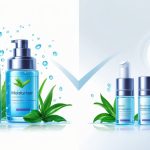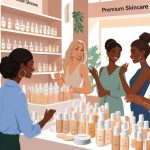Anti-Aging Moisturizers Now Outsmarting Pricey Prescription Creams
The Future of Anti-Aging Skincare
If I see one more ad promising “miracle retinol” or some laser I can’t afford, I might scream. Every brand in 2025 claims it’s invented something wild, but honestly? What actually works is a mashup of new ingredients and tech, and half of it’s confusing. Peptides are everywhere. Some do something, some don’t. Skincare isn’t magic. Lately, it’s all about AI-personalized routines, and I still can’t keep track of my SPF.
Innovative Ingredients and Technologies
Nobody talks about glycation, but it’s apparently ruining collagen while everyone’s distracted by vitamin C. Sugar at night? Bad news for skin, but who’s actually thinking about that at Sephora? The anti-aging industry is obsessed with antioxidants—vitamin C, chlorella, ginkgo biloba. Do they fight free radicals? Sure, maybe. Sometimes these serums work, sometimes they’re as disappointing as my morning espresso. My dermatologist friend is all about amino peptides for elasticity, but soy proteins are having their moment too, even though the research is kind of “meh.” “Needs more data” is just a fancy way of saying nobody knows.
Labels scream “cruelty-free,” but when I check ingredients, it’s a random mix of plants and mystery peptides. New launches brag about marine botanicals or lab-grown actives that “beat” prescription creams, but honestly, who can keep up? DNA-based formulas are a thing now (see these new 2025 formulas), and some are cheaper than my copay. I need a spreadsheet to figure out which serum is actually worth it, or if it’s just another overpriced dupe. Also, does every moisturizer with ginkgo biloba have to smell like abandoned tea?
Personalized Products and AI Trends
Now my phone yells at me to drink water, and my moisturizer wants to scan my face every morning. Seeing my pores at 200x? Not the wake-up call I wanted. Still, personalization isn’t just hype. These AI routines gobble up skin scans, weather reports, and probably my mood swings to spit out “custom” formulas. I tried one and got a night cream for oily T-zones even though I said combo skin. Flawless? Not really.
A friend tested some “adaptive hydration” cream from this 2025 anti-aging roundup. It changed ingredients every week and even sent her push notifications to wear SPF (she ignored them). The wildest part? The app flagged products with potential allergens—so I tossed half my shelf. Still, I keep buying every “DNA repair” serum that pops up. Personalization is cool, but it’s chaos. Like letting Spotify shuffle your skincare.
Frequently Asked Questions
Vitamin C serums, retinol, peptides—everyone’s got an opinion, but when I ask about texture or feel, people just parrot clinical studies. Where’s the actual scoop?
Which top-rated anti-aging moisturizers compete with pricey prescriptions?
I lost an hour reading ingredient lists and realized half my “favorites” have niacinamide. Is that the secret? I tried Roc Retinol Correxion and, weirdly, my skin felt smoother than when I used prescription tretinoin. But they warn about sun sensitivity like it’s the apocalypse. SkinCeuticals Triple Lipid Restore gets hyped everywhere—reviews and experts talk about “fat-deprived skin,” but no one mentions if I’ll get bored using it for months. It’s always about sticking to the routine, never about me falling asleep with mascara on.
What’s the best anti-aging cream for someone in their 40s?
Everyone shouts “peptides and SPF,” but nobody warns you about how staying up too late ruins your skin anyway. I chatted with a pharmacist—she pushed Olay Regenerist Micro-Sculpting Cream. Good hydration, sure, but I’m still searching for something that won’t pill under makeup. Recommendations change every week: ceramides, then antioxidants, then back to square one, staring at a shelf of half-used jars.
Can you recommend a leading anti-aging cream for people in their 50s?
Suddenly, everyone cares about collagen loss and ignores my drawer of failed creams. Obagi Hydrate Luxe is rich, almost too rich, but dermatologists seem to love it and I saw fewer flakes on my chin. My cousin is obsessed with Neutrogena Rapid Wrinkle Repair, and honestly, her skin looks amazing. Maybe humidity and sleep matter more than whatever’s in the jar. Who knows.
What do dermatologists suggest as the ultimate anti-aging cream that delivers results?
Tretinoin comes up every time, but insurance is a pain and honestly, over-the-counter adapalene is less drama. My dermatologist says SPF 30 is enough, but who remembers to reapply at a barbecue? Dr. Aanchal Panth swears by hyaluronic acid and a gentle retinoid. Skip the 12-step routines. But then you walk into a store and 500 jars glare at you, all demanding attention. It’s a circus.
Is there a moisturizer for deep wrinkles that experts swear by?
Deep wrinkles taunt me in the mirror and the internet just says “more moisture.” I splurged on La Roche-Posay Redermic R—felt decent, but nobody warned me about the weird flaky-glowy phase. In winter, my coworker tried face oils, but ended up with breakouts. Plot twist. Dermatologists keep repeating: stick to proven stuff—retinol, peptides, maybe glycolic acid. Apparently, nothing erases wrinkles overnight, no matter what the bottle promises.
Do premium anti-aging creams justify their high cost in effectiveness?
Okay, so, every beauty counter on earth is shoving Creme de la Mer at you like it’s some sort of secret elixir your grandma never told you about. BBC’s deep dive made me sit there, cross-eyed, picking apart the ingredient list—like, what even is “Miracle Broth”? And honestly, the price tags? They’re mostly just paying for a glass jar that weighs more than my phone and some marketing copy that promises you’ll look like you slept for a decade straight. I mean, after a certain point, does any of this stuff even do more than a decent drugstore moisturizer? I keep thinking, is the real anti-aging just not stressing over dropping a $300 jar on the bathroom floor? Maybe that’s the actual secret.



